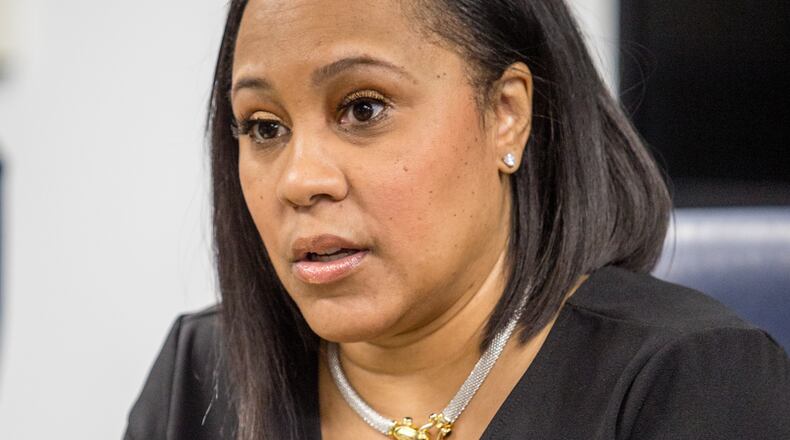District Attorney Fani Willis does not have any conflicts that warrant her disqualification from the Fulton County election interference case, according to a group of 17 ethics experts, former prosecutors and defense attorneys.
The coalition – which includes former Georgia-based federal prosecutor Amy Lee Copeland and onetime DeKalb DA J. Tom Morgan – filed a “friend of the court” brief late Monday laying out why Fulton Superior Court Judge Scott McAfee should dismiss multiple court motions alleging Wills acted improperly. The brief was also signed by Richard Painter, the top White House ethics lawyer during the George W. Bush administration who has more recently been active as a Democrat.
“Disqualifying conflicts,” the group wrote, “occur when a prosecutor’s previous representation of a defendant gives the prosecutor forbidden access to confidential information about the defendant or a conflict otherwise directly impacts fairness and due process owed a defendant.”
“That kind of conflict is not at issue here,” they said.
Five defendants in recent weeks, led by former Donald Trump campaign official Michael Roman, have argued that Willis has an untenable conflict of interest created by a previously undisclosed romantic relationship with Nathan Wade, the outside attorney she hired to spearhead the racketeering probe. Trump and 14 other defendants currently remain in the case.
Willis acknowledged a personal relationship with Wade in a court filing last week but contended that she did not improperly benefit financially. She has urged McAfee to cancel a previously-announced evidentiary hearing scheduled for February 15.
The ethics experts, who said they have no independent knowledge of Willis and Wade’s personal relationship, backed up the DA, arguing that even if all of the defendants’ allegations were true, they “do not even come close” to mandating her removal because they’re irrelevant to the underlying case.
They said judges typically view motions for disqualification skeptically, given the significant costs to taxpayers and the delays that typically result as new prosecutors try to get up to speed. Prosecutors, they said, are typically “trusted to fulfill their duties despite competing personal interests.”
They added that the defendants have similarly not provided adequate evidence to merit their other significant ask: that the criminal charges against them be dropped.
“Defendants have not shown that their constitutional rights were violated or that these proceedings were rendered fundamentally unfair due to any relationship between DA Willis and Wade. Nor can Defendants establish that they were actually prejudiced, so as to warrant this relief,” the group stated.
The former officials also defended Willis against criticism of her remarks last month at a historic Black church in Atlanta. Attorneys for Trump and others said Willis’ suggestion that her critics were playing the “race card” represented a “calculated effort to foment racial bias” into the case that could prejudice a jury.
The former prosecutors and ethics experts said Willis’ remarks are not disqualifying because they were not directed at a particular defendant, nor were they focused on the alleged guilt of any defendant or the merits of the case. They said the jury selection phase of the case was the most appropriate place to address whether Willis’ comments might have impacted the jury pool.
Even though they said there’s nothing to merit disqualification, they argued that if McAfee disagrees, Willis should be allowed to resolve the conflict – by reimbursing Wade for any shared expenses or changing his role in the case – so the prosecution can keep advancing in a timely manner.
About the Author
Keep Reading
The Latest
Featured





